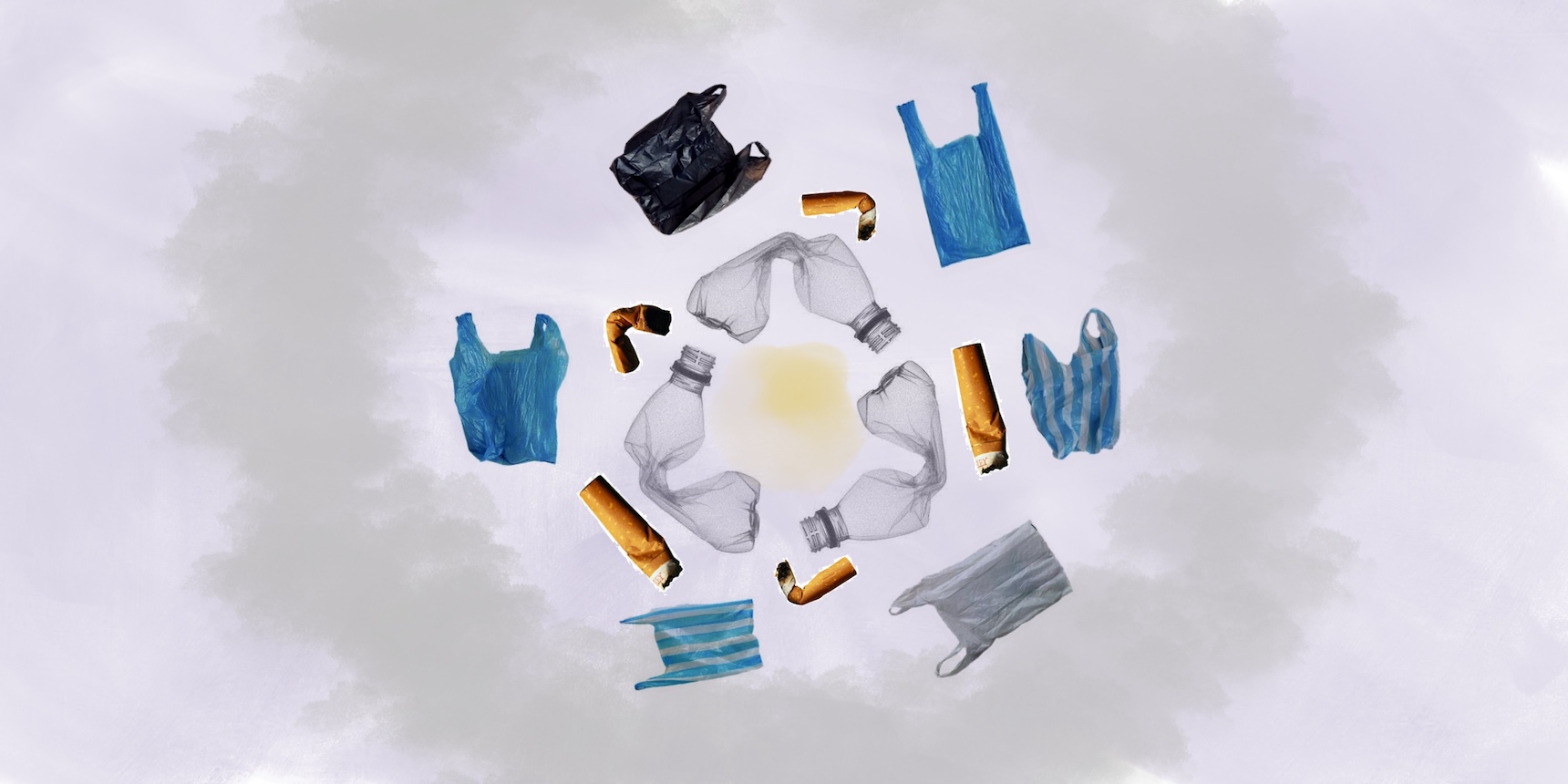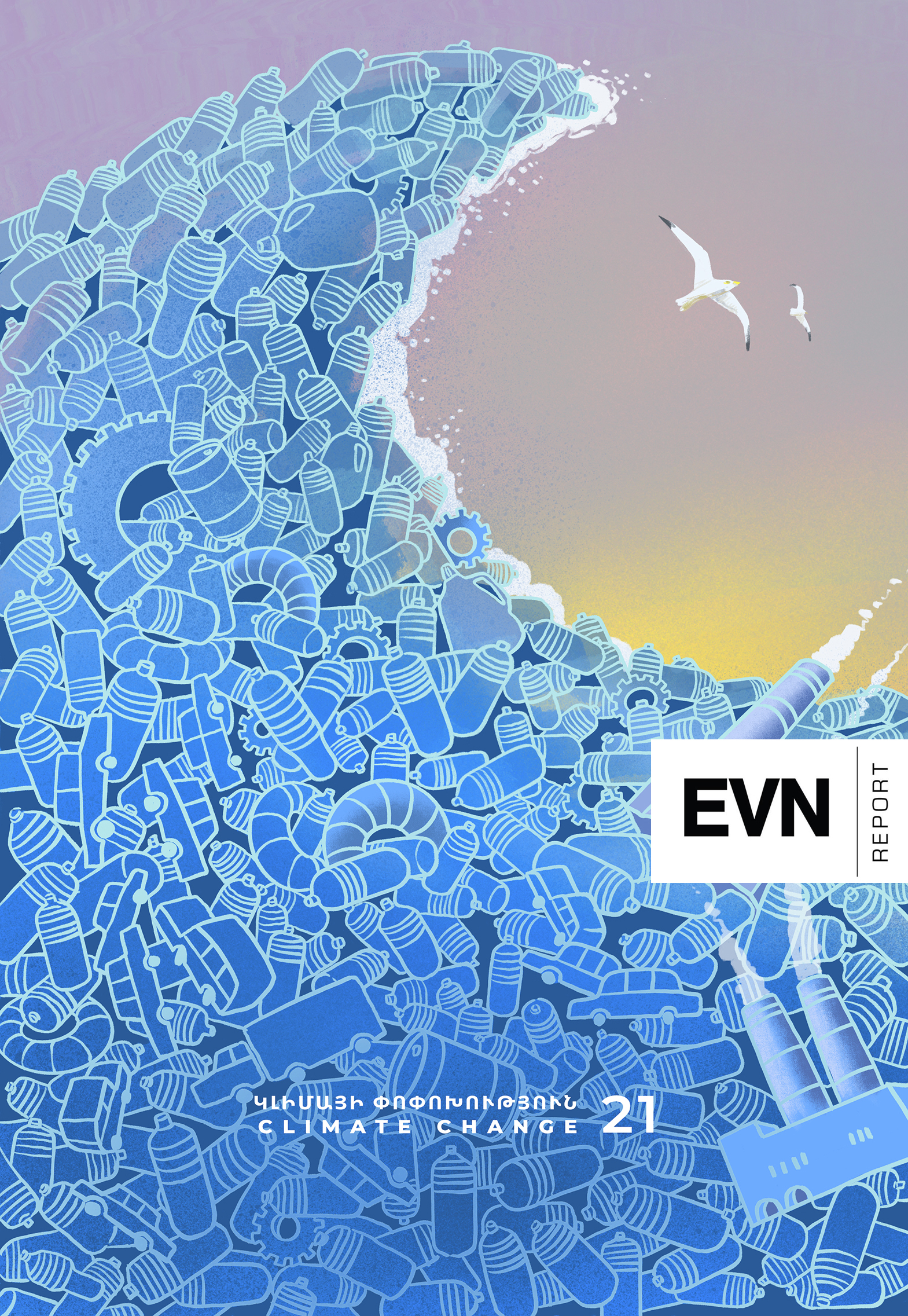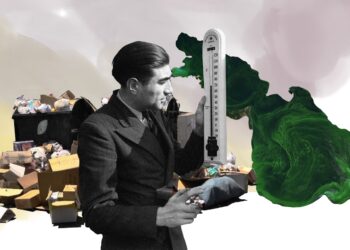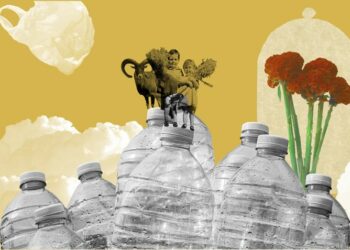

When Hripsime Mkrtchyan was 11 years old, an environmental organization from Norway visited her school to teach her class on how they can take care of their environment. Her journey toward environmentalism began at this moment in time. She started by preserving the amount of paper she used for her coursework by erasing old work on the same paper to make room for new work. Today she is an atmospheric physicist teaching at the American University of Armenia and the founder of EcoWaste, an organization that facilitates and promotes recycling in Armenia.
At first, Hripsime would let her friends know over social media that she would be collecting paper for recycling. Her first batch amounted to 40kg, but when the recycling company informed her this was not enough to warrant a pick-up, she collected 200kg more to add to it. Soon thereafter, calls began flooding in about more “collection events” where people could bring their paper recyclables. By collecting enough paper recyclables, they could then be sent off to a recycling plant and saved from a landfill. Given the demand and popularity of these collection events, plastic was also added to the list of recyclables. From the organization’s founding in 2018 until today, EcoWaste has saved the equivalent of thousands of trees in recycled paper.
The Yerevan Municipality introduced a recycling program in 2020, and by 2021 they had hundreds of waste containers across the city, including those for recycled paper, glass and plastic. EcoWaste does not facilitate collection anymore in favor of promoting the use of the municipal waste management system. They did however help the city with the placement of some of their bins, making them aware of areas where there was a high concentration of residents who would use their services. With this, recycling culture slowly began in Yerevan, but across Armenia there is still much work that needs to be done to live a “zero waste life.”
Individuals have the power to positively impact their communities and the natural world around them. More recently, Hripsime has been traveling to smaller communities outside of Yerevan that need guidance for recycling and waste management. A young girl in the village of Artik who was so inspired upon learning how important recycling is, began to do it for her community. At first, she began gathering paper throughout her community that otherwise would be sent to a landfill, and instead sent it to a recycling plant. Awareness and education in this sense can do wonders, and in turn, can empower young people to begin thinking differently about the environment they benefit from.
As the world is currently experiencing the effects of climate change, the accumulation of waste should not be left out of the conversation. According to the United Nations Environment Programme, 11.2 billion tons of solid waste is accumulated across the world annually, and within it the portion that is organic waste contributes to 5% of Earth’s greenhouse gas emissions. Furthermore, poor waste management habits also cause the degradation of soil, water and air pollution. The European Union has made the reduction of biodiversity loss one of their priorities. This is one of the many focuses of the European Green Deal, which contains a set of policies to combat the growing effects of climate change and aims to set the EU on the path to green transition. The goal is to reach climate neutrality by 2050.
In Armenia, there are many reasons to begin living an eco-conscious life, especially as all systems on Earth are interconnected. Throwing out a cigarette in downtown Yerevan will impact waterways and soil viability across the country. The Republic of Armenia accounts for 0.02% of greenhouse gas emissions worldwide and continues to be one of the lower emitters in the region. For context, China contributes 29% of the world’s greenhouse gas emissions and the U.S. 14%. Globally, Armenia’s contribution to climate change is arguably negligible. Locally, however, Armenians can find many ways to ameliorate its impact on their environment, raising their quality of life.
To begin, one must understand the danger of the world’s current climate situation and how the actions of humanity as a whole impact the environment. Scientists have named the Earth’s current geological epoch as the Anthropence. The previous era, known as the Holocene, existed for about 10,000 years where the Earth’s climate was extremely stable. With the onset of the industrial revolution in the 19th century, there was a move from agrarian economies to highly mechanized industrial economies. As a result of this shift, carbon dioxide emissions began rapidly increasing among other forms of pollution, as human action began to have a direct impact on the environment. Armenia is also looking to further industrialize its economy, and catch up to the rest of the world. In doing so, it is important to remember how such developments can have negative impacts on the natural world. On a local level, in order to counter this, Armenian citizens must be prepared to change their habits and how they engage with the environment.
One difficulty in the struggle against environmental degradation is the theory known as the “tragedy of the commons” based on Garret Hardin’s work from 1968. There are many common pool resources that Armenians share, such as water, air and land. The concept sees “rational” use of a common pool resource as enacted until the benefits are equal to the perceived costs. The problem is that individuals prioritize themselves above the collective when drawing from resources the collective benefits from. This leads to a devastating pattern of overuse, until said resource is depleted and the collective suffers as a whole. Only when it is too late, do individuals understand how interconnected they are to each other and to their environment.
In Armenia, such common pool resources are consistently depleted and simply misused. The Hrazdan River and Lake Yerevan are dump grounds for garbage by local businesses and residences in the capital. The Municipality of Yerevan collected 13,000 tons of garbage in July of 2021. Overuse would be the collection of this water for personal use, to clean clothes or to water plants. This example is simply misuse, which comes back to the lack of awareness of the importance of viable sources of freshwater and maintaining the biodiversity of these ecosystems.
Armenians should be concerned about biodiversity, as the variety of life found in nature has many benefits. This variety includes different types of ecosystems such as marine life and terrestrial life, whether it be animals, plants or fungi. For example, according to a USAID biodiversity assessment for Armenia, 10% of plants found in Armenia have medicinal usages. Similarly, there are over 200 species of plants commonly used for nutrition, aside from the 120 species of nuts and wild berries. These resources are taken for granted and are not cared for in a sustainable way, but individuals continue to treat them as if they are infinite.
Individuals need to understand that each person’s actions affect another’s, and in the end greed and misuse will result in collective suffering. The effects of climate change may not be overtly evident in current-day Armenia, but the continued waste build-up will lead to the contamination and depletion of the country’s natural resources. Furthermore, the increase in the Earth’s temperature will be much more apparent, in countries where there is biodiversity loss and resource depletion.
For such a small country, every act counts and one’s admiration for the beauty of Armenia’s mountains and valleys is not enough. Living an eco-conscious life will ensure the security and viability of Armenia, as the country becomes more sustainable and regenerative. Awareness promotes education, which in turn empowers individuals to make a change, and to take care of their communities, thus protecting the environment for generations to come.
Magazine Issue N21
Climate change is not something that will happen in the future; it is already happening and if not mitigated, will cause starvation and mass displacement on a global level. Armenia is recognized as vulnerable to climate change impacts due to a combination of political, geographic and social factors. This month’s magazine issue entitled “Climate Change” features articles that look at Armenia’s vulnerability to climate impacts; how accumulation of waste can contaminate soil, water, air and other systems and cycles that regulate the climate and the importance of alternative potential energy sources.
The Impact of Global Warming in Armenia
Armenia is a country highly vulnerable to climate impacts. The most vulnerable sectors are agriculture, water resources, forestry, transport and energy infrastructure. Is Armenia’s government doing enough to mitigate the impact of climate change?
Read moreAlso see
Armenia’s Environmental Security
Armenia has an incredible potential to tap into its natural resources sustainably and moreover ensure green economic growth. What is needed is visionary thinking as well as effective, professional and technocratic governance.
Read more



